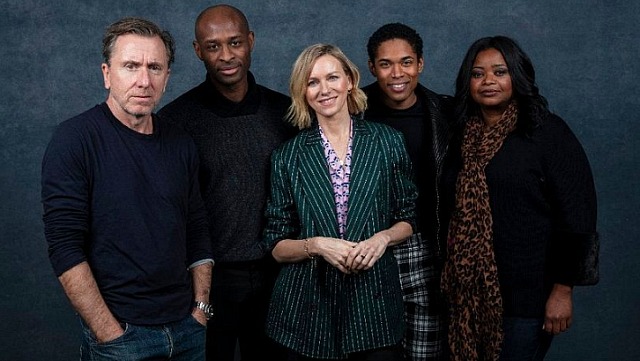I was half-mesmerized by Julis Onah‘s Luce, a tautly written, convincingly performed domestic drama about racial agendas, attitudes, assumptions and expectations. Set in an affluent Virginia suburb, the film explores a racially mixed group of characters and asks what their core-level attitudes or assumptions about “Luce” (Kelvin Harrison, Jr.), an adopted, African-born high school student, might be. But what it’s really doing is asking the audience these same questions.
Based on J.C. Lee’s 2013 play of the same name and co-adapted by Lee and Onah, it’s basically about uncertain or ambiguous attitudes about Luce, who may or may not be as bright, likable and reassuringly well-behaved as he projects himself to be. Or maybe the real problem is in the eyes of certain beholders.

(l. to r.) Tim Roth, director-cowriter Julis Onah, Naomi Watts, Kelvin Harrison, Jr., Octavia Spencer.
The trouble starts when Harriet Wilson (Octavia Spencer), a vaguely huffy, side-eyed teacher, assigns Luce to write about a historical figure but with a special encouragement to “think outside the box.” When Luce writes about a ’70s activist who flirted with terrorism, Harriett bristles and even freaks a bit. For whatever reason the notion of Luce being some kind of closet radical alarms her, and so (this struck me as weird) she decides to search his locker for possible evidence of subversion. She finds a paper bag filled with illegal fireworks.
Harriet meets Luce’s adoptive mom Amy (Naomi Watts), shows her the essay and bag of fireworks. Amy tenses about violating Luce’s privacy, but at the same time is grappling with concerns about her son, who was reared in a war-torn African nation during his first ten years, and the kind of person he may be growing into. Or perhaps is hiding behind a veneer of charm and good cheer.
Amy discusses her worries with husband Peter (Tim Roth). But when Luce comes home from school, she doesn’t speak her mind. There’s a “vibe” at the dinner table, but nobody mentions the elephant.
This is when I dropped out of Luce, and why I was only half-mesmerized. What kind of adoptive mother wouldn’t trust her son enough to be upfront about the content of a school essay or a certain paper bag, and the possible implications of these? Her reluctance to speak her mind (or uncomfortable suspicions) told me that she’s less loving and perhaps a bit more racist than even she realizes.
Of course, Amy and Peter’s reluctance to speak frankly to their son is a convenient device, as it allows the audience to wonder about Luce’s deep-down nature. More provocations occur, of course, as the film continues to toy with perceptions and suspicions. Who is Luce? Are we a bit uncertain about his core agenda because of his traumatic African background, or are the parents, teachers and school supervisors over-reacting to these undercurrents?
The film never really levels with the audience about Luce, and of course that’s the idea. Luce is definitely an intriguing film, and one that everyone will need to see when it opens later this year. Then again, as noted, I didn’t quite believe Amy and Peter’s behavior.
And I was annoyed by Andrea Bang‘s Stephanie, a former girlfriend of Luce’s who tells Amy that he’s “the best boyfriend I’ve ever had” and is still involved with him sexually, and yet is also willing, at Harriet’s prodding, to report a possible incident of sexual assault that happened when she was drunk. So he’s her favorite all-time boyfriend but she’s ready to accuse him of possibly being one of several guys who sexually assaulted her? (A colleague claims this is an insincere gambit on Stephanie’s part and that she’s somehow looking to discredit Harriet.)
Kelvin Harrison quote: “Luce will say dark things, but at the same time, they’ll sound so light — and he’ll do it with a smile on his face. He’s always smiling, making it easy for the other person, because that’s what we do — make it easy for the person who might be fearful of us. It’s making it easy for everyone else but ourselves. It’s that thing that a lot of black men [experience]: You have to work ten times as hard as the other person because of who you are, your skin color, or what you look like.”
Onah quote: “To the film’s audience, Harrison reveals much more…the subtle internal calculations Luce, hyper-aware that he will not be allowed to fail, is constantly running. He’s always doing the math to figure out what people want from him, while trying desperately not to cave under the pressure of an entire community’s expectations.
“The audience is forced to ask themselves really hard questions about the way their attitudes impact the expectations we put on other people, and on a much larger level have an impact on how power and privilege work in this society.”









